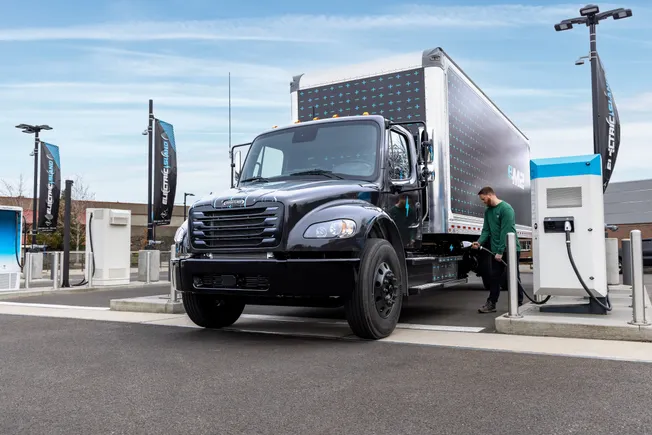Dive Brief:
Trucking organizations have criticized the Environmental Protection Agency’s (EPA) recently announced heavy-duty truck emissions standards, claiming they are unachievable within the set timelines. The phase three greenhouse gas emissions standards cover model years 2027 to 2032 and are 40% more stringent than previous federal regulations, according to the EPA.
Dive Insight:
The Clean Freight Coalition, which comprises the American Trucking Associations, American Truck Dealers, among others, was established last year to challenge emissions standards perceived as impractical by industry stakeholders. The coalition pointed out potential roadblocks to these federal standards by commissioning a study from Roland Berger, which estimated that the infrastructure requirements for complete electrification of trucking could reach nearly $1 trillion.
Jim Mullen, Executive Director of the Clean Freight Coalition and a former acting head of the Federal Motor Carrier Safety Administration, highlighted the limitations of electric vehicles, stating that they are still in early development and just beginning to undergo testing. “Currently, these vehicles do not meet the operational needs of many motor carrier applications, reduce the payload capacity of trucks, and thus necessitate more vehicles for equivalent freight transport,” Mullen remarked.
He also pointed out the lack of adequate charging and alternative fueling infrastructure to facilitate the adoption of these vehicles. The coalition believes it would be more practical to start with the electrification of medium-duty trucks, which the industry has already begun to explore.
As of now, less than 1% of commercial vehicle sales in the U.S. comprise zero-emission vehicles, according to Laura Perrotta, President of American Truck Dealers. She expressed concern that the new EPA regulations could have severe adverse effects on American commercial trucking, numerous U.S. businesses, consumers, and potentially even on overall emissions and the environment.
However, not all industry players are opposed to the new regulations. Prior to the standards’ announcement, Cummins, alongside Ford, BorgWarner, and other manufacturers in the Heavy-Duty Leadership Group, advocated for the EPA to implement the regulations promptly. Shelley Knust, Cummins’ VP of product compliance and regulatory affairs, stated in February that “Phase 3 will provide the regulatory certainty needed to drive industry-wide investments for the next generation of decarbonization technologies.”


